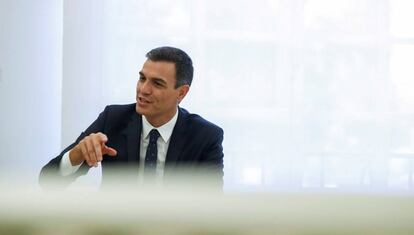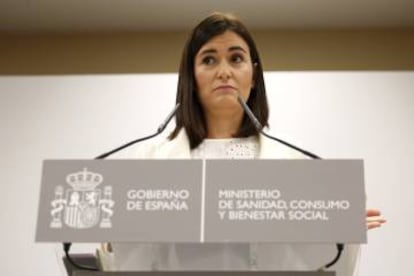Spanish PM publishes doctoral thesis in bid to quell plagiarism claims
In the wake of accusations of irregularities, the government said this morning it had subjected Pedro Sánchez’s academic text to two separate detection services and that it had passed

In response to accusations that his doctoral thesis contains plagiarized work and may have been written by someone else, the Spanish prime minister, Pedro Sánchez of the Socialist Party (PSOE), has had the academic text tested via two plagiarism detection programs, Turnitin and Plagscan, the government said.
The results were made public this morning by La Moncloa prime ministerial palace. In a statement, the government said that the evaluation has “determined the original content of the thesis,” which passed “the studies of coincidences to a high degree.”
If 13% of the text was appropriated from other sources without citing them, that would be plagiarism
La Moncloa also published the full document on Friday at 1pm. It can be downloaded at this URL. Sánchez had said on Thursday that the thesis would be made available at some point on Friday. Until today, the document was only available to the public in hard copy format at the library of Camilo José Cela University in Madrid, where Sánchez earned his PhD in economics and business.
His 2011 thesis has come under scrutiny this week after the leader of center-right party Ciudadanos, Albert Rivera, questioned the authenticity of the work in Congress. The accusation came a day after the health minister, Carmen Montón, was forced to quit over plagiarism and irregularities in connection with a master’s degree she earned at Madrid’s King Juan Carlos University (URJC).
The current leader of the conservative Popular Party (PP), Pablo Casado, is also caught up in an ongoing scandal regarding the way he earned a master’s degree from URJC. Casado is refusing to quit over the matter, which is now in the hands of the Supreme Court, where judges will decide whether or not to start trial proceeedings.

The plagiarism test results announced by La Moncloa this morning turned up a 13% rate of coincidence with other works on Turnitin, and 0.96% on Plagscan. These results, the government claimed, are due to “the obligatory quotes and references required to write any kind of research paper,” and stated that the software “cannot tell these apart despite being very advanced technology.”
On their own, these percentages are not particularly conclusive. According to a number of university professors that EL PAÍS spoke to, a 20% to 25% level of coincidence is acceptable, but it is not the same if these are attributable to referenced sources, or if the passages are reproduced without attribution. If 13% of the text was appropriated from other sources without citing them, that would be plagiarism.
According to a long Facebook post written by Sánchez himself yesterday, the full text will be available “at some point today [Friday].” Until now, and at the prime minister’s discretion, the thesis was only available in a hard copy format at the university library.
Earlier this week the Spanish daily ABC ran a front-page story claiming that Sánchez had copied entire paragraphs from other authors, although the examples that it provided have their sources referenced in footnotes and in the bibliography.
Other media outlets have claimed or insinuated that the entire work was written by economist Carlos Ocaña, who was then the chief of staff for the Industry Ministry under a PSOE administration. Ocaña has denied this claim.
In the Facebook message published yesterday, Sánchez stated that he had written the entire thesis himself, that it met with all of the requirements set out by law, and that he had defended it before a panel. For its part, the Camilo José Cela University confirmed in a statement this week that the process had been completely “normal” after carrying out an internal audit.
Another politician who was forced to resign over an academic scandal earlier this year was the PP’s Cristina Cifuentes, who was the regional premier of Madrid. She also was accused of irregularities over the master’s degree she obtained from King Juan Carlos University, and was unable to produce her final thesis. She claimed she had done nothing wrong but was eventually forced to quit when a video of her shoplifting from a supermarket was leaked to the press.
English version by Simon Hunter.
Tu suscripción se está usando en otro dispositivo
¿Quieres añadir otro usuario a tu suscripción?
Si continúas leyendo en este dispositivo, no se podrá leer en el otro.
FlechaTu suscripción se está usando en otro dispositivo y solo puedes acceder a EL PAÍS desde un dispositivo a la vez.
Si quieres compartir tu cuenta, cambia tu suscripción a la modalidad Premium, así podrás añadir otro usuario. Cada uno accederá con su propia cuenta de email, lo que os permitirá personalizar vuestra experiencia en EL PAÍS.
¿Tienes una suscripción de empresa? Accede aquí para contratar más cuentas.
En el caso de no saber quién está usando tu cuenta, te recomendamos cambiar tu contraseña aquí.
Si decides continuar compartiendo tu cuenta, este mensaje se mostrará en tu dispositivo y en el de la otra persona que está usando tu cuenta de forma indefinida, afectando a tu experiencia de lectura. Puedes consultar aquí los términos y condiciones de la suscripción digital.








































